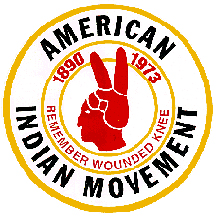The American Indian Movement (AIM) is an American Indian advocacy group in the United States, founded in July 1968 in Minneapolis, Minnesota. AIM was initially formed to address American Indian sovereignty, treaty issues, spirituality, and leadership; while simultaneously addressing incidents of police harassment and racism against Native Americans forced to move away from reservations and tribal culture by the 1950s-era enforcement of the U.S. federal government-enforced Indian Termination Policies originally created in the 1930s. The original founders of AIM included Dennis Banks, George Mitchell, George Mellessey, Herb Powless, Clyde Bellecourt, Vernon Bellecourt, Harold Goodsky, Eddie Benton-Banai, and a number of others in the Minneapolis Native American community. Russell Means, born Oglala Lakota, was an early leader in 1970s protests. (More from Wikipedia)
In 1973, Redbone recorded the politically oriented “We Were All Wounded at Wounded Knee”. The Wounded Knee Massacre was the last major battle between American Indian tribes and the U. S. Cavalry; the battle had gained a higher profile in the American consciousness with the 1970 publication of Bury My Heart at Wounded Knee, Dee Brown’s acclaimed overview of American history (particularly the Old West) from a Native American perspective.
Also, earlier in 1973, members of the activist group American Indian Movement (AIM) occupied the Pine Ridge Reservation near Wounded Knee, South Dakota. Russell Means (Oglala) – who died in October 2012 – is the best-known member of AIM and is arguably the most famous Native American of the past 100 years. Means was also an actor – he appeared in the 1992 film, The Last of the Mohicans – and released several albums in a variety of musical genres, including his version of hip-hop that he called “Rap-aho”.
(August 2013)















